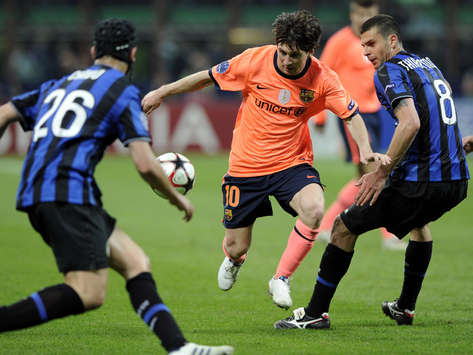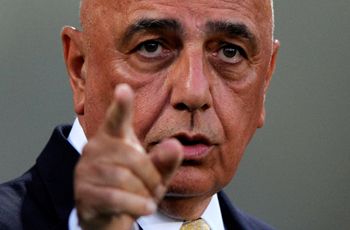With footballer unions rising up in Spain & Italy, leading to the cancellation of La Liga's first round and a possible delay to Serie A's start, is this a sign of things to come?

COMMENT
By Keir Radnedge
Footballers going on strike in Spain and Italy may be an astonishing development for fans who associate the likes of Lionel Messi and Cristiano Ronaldo, Alexandre Pato and Javier Zanetti with Hollywood lifestyles and banker-type bonuses.
But the disputes which prevent La Liga kicking off this weekend and may halt Serie A’s resumption next week concern an issue endangering the professional game far beyond southern Europe: the failure of too many clubs – usually, but not only - lower down the league ladders, to pay their players.
Laws governing contracts of employment in any industry – whether football or fisheries – are important strands in the framework of society.
The headline issue here concerns the irresponsibility of too many clubs and owners in living beyond their means. Beyond that is a further, even more sinister, danger: unpaid players are vulnerable to underworld fixers corrupting the game on behalf of internet-empowered betting syndicates.
As FIFA has discovered belatedly, fixing is widespread. This has corroded the credibility of domestic competition not only in south-east Asia and Africa but in Belgium, Finland, Germany, Greece and Turkey, to name but a handful of infected European countries.
Back to the strikes.
The principal point at issue in Spain concerns the operation of a salary guarantee fund which provides a theoretical safety net for players left high and dry by indebted clubs.
According to the Liga de Futbol Profesional, the fund is struggling already to cope with the number of collapsing clubs while the Asociación de Futbolistas Españoles (AFE) wants action to reduce a 50 million euro wages debt mountain.
THREE SPAIN STARS SUPPORTING STRIKE
A further complication is collapsing clubs’ use of a law created to assist struggling businesses. This allows them to set aside contractual responsibilities while continuing in business and not even being punished, as in some other countries, with a loss of league status.
As is sadly commonplace in such disputes, the gap between the two sides has been expanded by a vitriolic war of words. The league says strike action is unjustified and risks fixtures chaos later in a jam-packed season while the players accuse the league of intransigence and a lack of goodwill.
The players had called their strike for both the first two rounds of the season and it may be a glimmer of hope that various meetings are planned over the weekend and early next week in pursuit of a peace deal.
This isn't about more money. We ask only that players get paid what it says in their contracts
If a resolution proves impossible then Barcelona, Real Madrid and the rest will not see Liga action until mid-September because the first weekend of next month is reserved for national team competition.
Concern over pay guarantees is the main issue in Italy, too. Here the Associazione Italiana Calciatori has reasserted itself since Damiano Tommasi, the former Italy and Roma midfielder, took over as leader earlier this year from long-serving Sergio Campana.
A draft agreement between clubs and players has been on the table for several months but the league rejected demands by the AIC concerning the treatment of players excluded from a club’s first-team squad. Too often, says the AIC, such decisions are taken only on the eve of a season when it is too late for a sudden glut of unwanted players to find new clubs.
The dispute has intensified because of an unconnected row prompted by the government’s proposal of a high-earners ‘solidarity tax’ among emergency measures deemed essential to ease the country’s financial crisis.
Rather than gross earnings, Italian players’ contracts stipulate pay rates in terms net of tax and social security payments; these are paid by the clubs. However meeting the ‘solidarity tax’ could add significantly to the wages bills of the Milans and Inters; the consequences could also affect clubs’ abilities to meet the strictures of UEFA’s financial fair play system.
Milan’s chief executive, Adriano Galliani, insists that the players should pay the extra tax; the players say that, contractually, the clubs are duty-bound to pick up the bill.
Provocatively several government ministers, whether through mischief or misunderstanding, have presented the strike threat as an attempt by rich footballers to evade their patriotic duty. This has merely added fuel to the fire.
Strike threats by players in both Italy and Spain are not new; it’s laudable, even, to see the superstars standing up for the journeymen. Rarely, however, have such strike threats been carried through. Spain, this weekend, is something of a watershed.
That some of the world’s leading players should find a coherent, unified voice may raise other intriguing issues for the long-term governance of the game.
By Keir Radnedge
Footballers going on strike in Spain and Italy may be an astonishing development for fans who associate the likes of Lionel Messi and Cristiano Ronaldo, Alexandre Pato and Javier Zanetti with Hollywood lifestyles and banker-type bonuses.
But the disputes which prevent La Liga kicking off this weekend and may halt Serie A’s resumption next week concern an issue endangering the professional game far beyond southern Europe: the failure of too many clubs – usually, but not only - lower down the league ladders, to pay their players.
Laws governing contracts of employment in any industry – whether football or fisheries – are important strands in the framework of society.
The headline issue here concerns the irresponsibility of too many clubs and owners in living beyond their means. Beyond that is a further, even more sinister, danger: unpaid players are vulnerable to underworld fixers corrupting the game on behalf of internet-empowered betting syndicates.
As FIFA has discovered belatedly, fixing is widespread. This has corroded the credibility of domestic competition not only in south-east Asia and Africa but in Belgium, Finland, Germany, Greece and Turkey, to name but a handful of infected European countries.
Back to the strikes.
The principal point at issue in Spain concerns the operation of a salary guarantee fund which provides a theoretical safety net for players left high and dry by indebted clubs.
According to the Liga de Futbol Profesional, the fund is struggling already to cope with the number of collapsing clubs while the Asociación de Futbolistas Españoles (AFE) wants action to reduce a 50 million euro wages debt mountain.
THREE SPAIN STARS SUPPORTING STRIKE
| Casillas | Villa | Alonso |
 |  |  |
A further complication is collapsing clubs’ use of a law created to assist struggling businesses. This allows them to set aside contractual responsibilities while continuing in business and not even being punished, as in some other countries, with a loss of league status.
As is sadly commonplace in such disputes, the gap between the two sides has been expanded by a vitriolic war of words. The league says strike action is unjustified and risks fixtures chaos later in a jam-packed season while the players accuse the league of intransigence and a lack of goodwill.
The players had called their strike for both the first two rounds of the season and it may be a glimmer of hope that various meetings are planned over the weekend and early next week in pursuit of a peace deal.
This isn't about more money. We ask only that players get paid what it says in their contracts
- AFE president Jose Luis Rubiales
If a resolution proves impossible then Barcelona, Real Madrid and the rest will not see Liga action until mid-September because the first weekend of next month is reserved for national team competition.
Concern over pay guarantees is the main issue in Italy, too. Here the Associazione Italiana Calciatori has reasserted itself since Damiano Tommasi, the former Italy and Roma midfielder, took over as leader earlier this year from long-serving Sergio Campana.
A draft agreement between clubs and players has been on the table for several months but the league rejected demands by the AIC concerning the treatment of players excluded from a club’s first-team squad. Too often, says the AIC, such decisions are taken only on the eve of a season when it is too late for a sudden glut of unwanted players to find new clubs.
| GALLIANI ON TAXES |
 This is not an income tax, it is a solidarity contribution. They can go on strike for the rest of their lives - Adriano Galliani |
Rather than gross earnings, Italian players’ contracts stipulate pay rates in terms net of tax and social security payments; these are paid by the clubs. However meeting the ‘solidarity tax’ could add significantly to the wages bills of the Milans and Inters; the consequences could also affect clubs’ abilities to meet the strictures of UEFA’s financial fair play system.
Milan’s chief executive, Adriano Galliani, insists that the players should pay the extra tax; the players say that, contractually, the clubs are duty-bound to pick up the bill.
Provocatively several government ministers, whether through mischief or misunderstanding, have presented the strike threat as an attempt by rich footballers to evade their patriotic duty. This has merely added fuel to the fire.
Strike threats by players in both Italy and Spain are not new; it’s laudable, even, to see the superstars standing up for the journeymen. Rarely, however, have such strike threats been carried through. Spain, this weekend, is something of a watershed.
That some of the world’s leading players should find a coherent, unified voice may raise other intriguing issues for the long-term governance of the game.
No comments:
Post a Comment